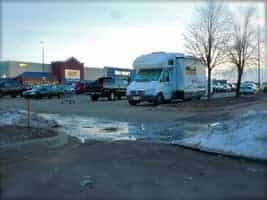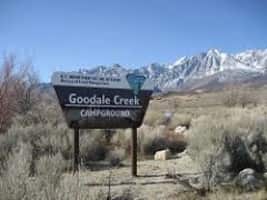Contents
What Is Boondocking?
Good question! Even so, it pleases me to share with you the concept of boondocking from my personal findings (both experience and research-wise).
So in the actual sense, what does boondocking mean?
What is boondocking? In simple terms, boondocking is basically camping around uncivilized areas without hookups (i.e water supply, shower, sewer, conventional power/electricity supply, etc). In some instances, you may have also heard of it being referred to as “dry” or “wild” camping.
Touristic Benefit:
Whichever way, boondocking is obviously a great way to get away from cities, traffic, crowded campgrounds, and surround yourself with nature in its purest or quintessential form.
Financial Benefit:
At the same time, you’ll also have the rare opportunity to save some money on lodging – while doing so; (boondocking).
Decisions Based On Individual Perceptions (Likes And Dislikes)
Furthermore, one key question you’ll have to ask yourself is whether or not boondocking is right for you.
That said, if you really enjoy being in the great outdoors and don’t mind or care if you forgo a few amenities, then it just might be a perfect match for you.
But meanwhile, if you cherish nor prefer to be surrounded by neighbors and recreational activities, then you might be happier or comfortable in a traditional campground.
Nonetheless, if you’re not ready to fully commit to the notion or idea of camping without necessities like (running water, public restroom, just to mention a few).
You could as well choose to do a combination of both camping styles.
That way, you surely will get the best of both worlds; (Even in terms of comfort, a free, fully endowed and immersive wilderness experience).
Key Note:
Going forward, it is also imperative for you to concentrate, channel, or focus your impacts in heavily used areas.
The reason is that a good number of the areas that are easily accessible do bear, receive, or record heavy utilization during the summer months.
Meanwhile, if there’s a fire ring at the environment or area, do not build or erect a new one.
That would sometimes mean you certainly have to clean out the old fire ring and don’t forget nor abandon the collapsible shovel.
Obviously, we all have to play our individual roles in a bid to keep these areas open or accessible for other people who also prefer this type of experience.
Other Vital Information:
Having said that, here are some important information you would need to know in a bid to have a decent boondocking experience;
- Obtain Permission
- Comply With Existing Rules
- Don’t Overstay
- Make A Purchase
- Maintain Orderliness
- No Hydraulic Jack
- No Littering
Obtain Permission:
A good number of retailers (the likes of Walmart etc) do have an existing policy that allows boondocking.
But even at that, you must always make sure to confirm it via an authorized individual.
So you will know whether or not it is okay to park your RV (Recreational Vehicle) in their parking lot for the night.
And while you’re at it, also be sure to ask about any ground rules that they would like you to obey.
On the flip side, if you plan to boondock around any state-owned ground facility. also en
Be sure to seek permission from regulatory agencies like the National Forest Service System, or the Bureau of Land Management.
Comply With Existing Rules:
It is a known fact that many businesses have existing posted rules or policies regarding how the parking lot can be utilized.
That being said, always be sure you read their regulations with the utmost care whenever you stop for the night.
There are times, that RV (Recreational Vehicle) travelers are mandated to vacate the area by a specific period of time in the morning (for instance).
Otherwise, they are usually told to park in certain specified sections of the lot.
Don’t Overstay:

Yeah, regardless of how nice it is to have a free place to park your recreational vehicle while boondocking.
The very last thing you should do nor even have on your mind is to – overstay your welcome.
Of course, it is generally known and understood that boondocking is sometimes a ”one night only” setup or arrangement.
But however, in many areas – it is quite possible to find or locate multiple places where you could park your motor home overnight.
perhaps as a way to enable you to cobble something together.
Make A Purchase:
While this practice is certainly not compulsory, required, or expected, it is pretty cool or nice to warmly appreciate the business owner by making some sort of purchase.
That being said, do ensure to make a point of stopping inside, so you could check things out, and as well buy some things you might be low on in a bid to show your appreciation.
Maintain Orderliness:
It is imperative to note that while boondocking, you may have to park for the night – (especially to get some sleep or a night’s rest).
Even so, some campers do make a point of taking up as small of a space as possible.
That being the case, be sure that you don’t bust out the grill, table, chairs, awning, whatever.
Kindly leave everything packed away, so you are ready to get moving right away the next morning.
Besides, your property or belongings may not be safe if they are left unattended in a parking lot.
However, do the needful while you maintain orderliness.
No Hydraulic Jacks:
More often than not, a hydraulic jack is capable of causing some damage to parking lots – even to asphalt materials.
That being the case, always avoid using yours while boondocking with your motor home or perhaps another recreational vehicle.
Of course, it may be quite a bit less convenient or comfortable.
But on the other hand, the last thing you want to do or think of doing is – damage the business’s parking lot after they showed you so much hospitality.
No Littering:
More specifically, you should just avoid or do away with any littering while you are boondocking.
You obviously should make a concerted effort to leave your environment cleaner than when you found it.
This, of course, is a great way to show or prove to retailers that RVers ( RV, class ‘A’ toy hauler travelers, whatever) are excellent guests with every sense of decorum.
Key Note:
Even so, it increases or raises the odds that they will continue to allow people to boondock subsequently in the future.
So prior to your leaving or vacating the area, always make sure you clean up any litter that you see or notice. You should also avoid leaving a trace, mark, or any sign that indicates you were there.
More specifically, you should clearly see that this is the proper boondocking etiquette way or manner of conduct. This is mostly about being a good, and conscientious guest who upholds high values.
Also remember, you are being allowed or granted the rare privilege to park on someone else’s property for free.
P.S – So don’t make them regret it by breaking or violating the rules of etiquette that were highlighted above or were mentioned and discussed in detail.
Where Can Someone Boondock For Free?
Just like primitive camping, having knowledge of specific public lands that allow free boondocking exercise – makes locating or finding a free area much easier.
Meanwhile, some reliable websites do also have pretty good guidelines on a number of public lands that do allow boondocking.
Having said that, it is quite obvious that the Bureau of Land Management (BLM) and Forest Service lands – (for the most part of their dealings), do allow boondocking activities for up to fourteen (14) days.
Likewise, ”Wildlife Management Areas” also often permit or allow it.
Key Note:
But however, always be sure to check and confirm that you don’t need a permit; (In other words – there are no restrictions).
Meanwhile, also remember to consciously keep an eye out for “no boondocking or lodging or camping signs” too.
Ensuring Safety While Boondocking:
Aside from the fact that boondocking comes with a sense of euphoria while interacting with nature, there’s also some risk to it.
That’s one key reason it is advisable to go along with a partner – (both human, and a pet if at all possible).
Yeah, that would be great.
The reason is that you’re not close to any form of assistance that could come from good-spirited individuals or law enforcement agencies.
Helpful Tips:
- Grant no stranger access to your rig.
- Reach out for stakes as quickly as possible – in times of uncertainty.
- Take advantage of the exterior lights at night, but don’t go out to confirm what’s out there.
- Trust God, be vigilant, and sometimes apply common sense.
- Make plans for rainwater that could affect your sizable, plain, fair looking, and dehydrated creek bed.
- Take into consideration your escape strategy in times of a fire outbreak.
- Take advantage of a telephone, hiking, GPS, stun gun, snake bite kit, and a couple of other useful tools for safety.
- Don’t ignore nor turn down those gut feelings – (that could just be providence ministering early signs of danger to you).
